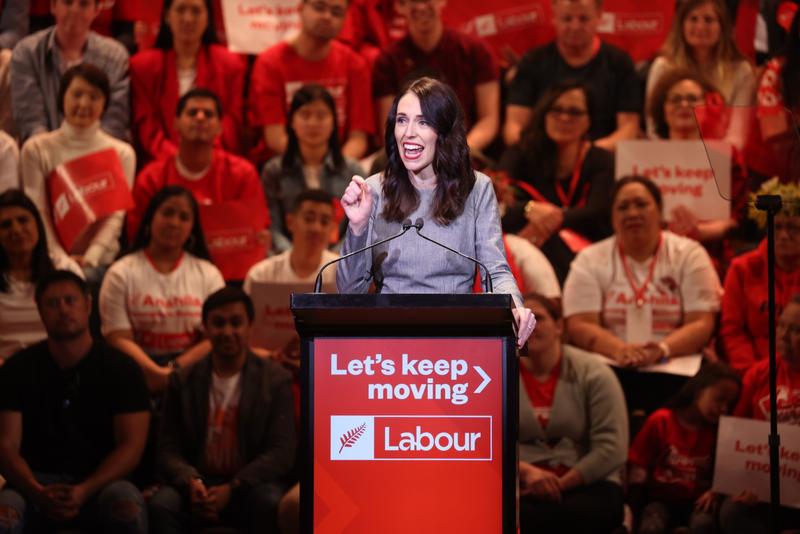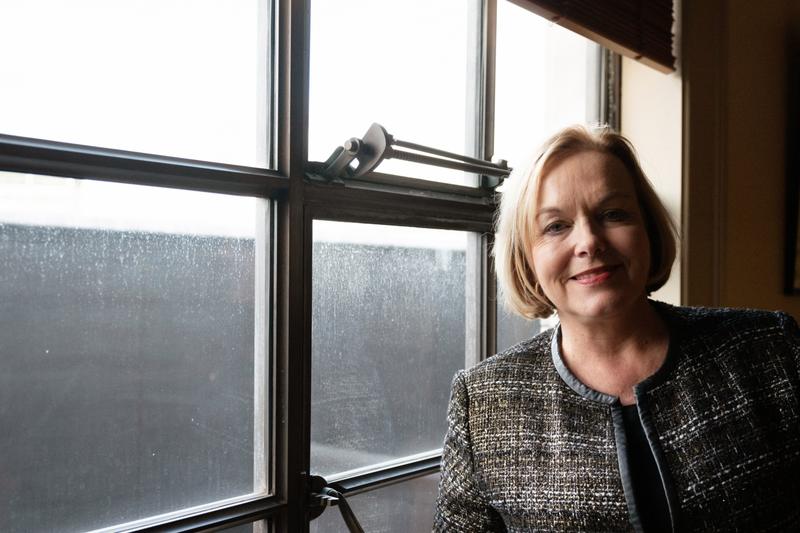 Jacinda Ardern speaks during the Labour Party election campaign launch, Aug 8, 2020. (BLOOMBERG)
Jacinda Ardern speaks during the Labour Party election campaign launch, Aug 8, 2020. (BLOOMBERG)
New Zealand Prime Minister Jacinda Ardern launched her campaign for a second term by reminding voters of her leadership credentials and pledging to steer the country through the economic crisis unleashed by COVID-19.
The Sept 19 election is “more important than ever” because of the pandemic, Ardern told Labour Party faithful in Auckland on Saturday. “It’s about the future. It’s about leadership and it’s about values,” she said. “It’s about whether we stop and change to another team, or whether we keep those we know and we trust.”
Keeping debt low is important to us, and we’ve shown that. But that need not be at the expense of health and education, and it shouldn’t mean leaving people behind. And that is the difference between Labour and others.
Jacinda Ardern, New Zealand PM
Labour is riding high in opinion polls after Ardern led the country through one of the world’s strictest lockdowns and achieved the rare feat of eliminating community transmission of the coronavirus. By contrast, the main opposition National Party has been beset by internal ructions and scandals, prompting it to change leaders twice this year.
New Zealand now faces its biggest economic challenge in generations, with unemployment set to surge after the loss of international tourism, a key foreign exchange earner. The next government will need to create new industries and jobs, and find a way to safely reopen the border, which has been closed to foreigners since the pandemic struck.
READ MORE: Poll: Ardern becomes NZ's most popular PM in a century
Ardern squares off against new National leader Judith Collins, a hard-nosed conservative who claims her party is more capable of navigating the economic recovery.
Policy platforms
There is little to separate the two parties in terms of policy at the moment as they have yet to reveal their full platforms. Both have pledged massive infrastructure spending to create jobs and boost growth, while neither is currently proposing tax hikes or cuts.
National has said it would aim to reduce net government debt to 30 percent of gross domestic product within a decade, which Ardern says would require huge cuts to public spending. Labour would instead focus on growing the economy to reduce the debt ratio.
“Keeping debt low is important to us, and we’ve shown that,” she said today. “But that need not be at the expense of health and education, and it shouldn’t mean leaving people behind. And that is the difference between Labour and others.”
The success of New Zealand’s lockdown means it now has “one of the most open economies in the world” and a head start on its recovery, Ardern said.
It is her crisis management skills that have won Ardern global praise.
 New Zealand's National leader Judith Collins (PHOTO/BLOOMBERG)
New Zealand's National leader Judith Collins (PHOTO/BLOOMBERG)
Her brand of decisive, empathetic leadership grabbed the world’s attention when she had to deal with the horrific attack on two Christchurch mosques last year, in which 51 worshippers were massacred. Those qualities were again on display when a volcano off the coast erupted in December, killing 21 people and injuring dozens.
“When we had hard decisions to make, we have been strong, we have been empathetic, and we have been kind,” she said.
Crusher Collins
Collins, nicknamed “Crusher” after her spell as a hard-line police minister, is likely to be a formidable opponent, but polls suggest it’s Ardern who’s on course for a crushing election victory
Still, her center-left government has failed to deliver on some key policies, such as a pledge to build 100,000 new homes to ease a housing crisis. National says those shortcomings show Labour can’t be trusted to get things done.
Collins, nicknamed “Crusher” after her spell as a hard-line police minister, is likely to be a formidable opponent, but polls suggest it’s Ardern who’s on course for a crushing election victory. Labour had 53 percent support in a 1News/Colmar Brunton poll published July 30, while National mustered just 32 percent.
National is trying to recover from two embarrassing scandals -- one of its politicians leaked confidential COVID-19 patient details, while another resigned amid allegations he sent pornographic images to young women.
ALSO READ: 'Crusher' Collins pulls no punches in bid to oust NZ's Ardern
No party has secured an outright majority since New Zealand introduced proportional representation in 1996, with the two major parties relying on the support of smaller partners to govern. Labour’s natural ally is the Green Party, while National can count on the libertarian Act Party.
The populist New Zealand First Party, led by the maverick Winston Peters and currently in coalition with Labour, looks set for political oblivion with just 2 percent support in the latest poll. Parties must either win an electorate seat or get 5 percent of the vote to get into parliament.


